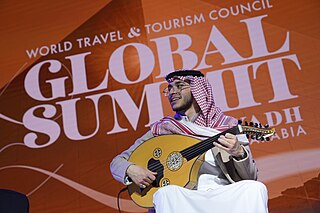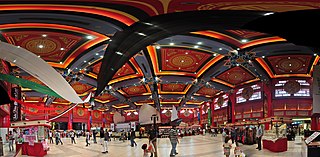Related Research Articles

Taif is a city and governorate in the Province of Makkah in Saudi Arabia. Located at an elevation of 1,879 m (6,165 ft) in the slopes of the Hijaz Mountains, which themselves are part of the Sarat Mountains, the city has a population of 563,282 people in 2022, making it one of the most populous cities in the kingdom.

Football is the most popular sport in Iran, with wrestling and volleyball as close contenders. Football has been a part of life for Iranians for many decades now and is played in schools, streets, and football clubs nationwide.

The music of Saudi Arabia includes both Western and traditional music. The most distinguished musician in recent Saudi history is Tariq Abdulhakeem, who composed hundreds of famous Saudi songs for himself as well as for other singers; Saraj Omar has become a very prominent composer after writing the music for the Saudi national anthem; Mohammed Abdu, the most famous singer in the Arab world; Talal Maddah who died in August 2000 while singing in the summer festival on the stage of Al-Muftaha Theatre in the southern region of Saudi Arabia. The 1st Arab Pioneers Festival, which was held in Cairo under the patronage of the Arab League, honored four of the lead composers in Saudi Arabia: Tariq Abdulhakeem, Ghazi Ali, Mohamed Alsenan, and Mohammed Shafiq. Of the same generation are the oud virtuoso Abadi al Johar, Rabeh Saqer and Abdul-Majeed Abdullah.

Sex segregation, sex separation, sex partition,gender segregation,gender separation, or gender partition is the physical, legal, or cultural separation of people according to their biological sex at any age. Sex segregation can refer simply to the physical and spatial separation by sex without any connotation of illegal discrimination. In other circumstances, sex segregation can be controversial. Depending on the circumstances, it can be a violation of capabilities and human rights and can create economic inefficiencies; on the other hand, some supporters argue that it is central to certain religious laws and social and cultural histories and traditions.

Elections in Saudi Arabia are rare. Municipal elections were last held in 2015, the first time women had the right to vote and stand as candidates.

Women-only passenger cars are railway or subway cars intended for women only. They are a result of sexual segregation in some societies, but also can result from attempts to reduce sexual harassment and assault such as groping.

Lesbian, gay, bisexual, and transgender (LGBT) people in Saudi Arabia face repression and discrimination. The government of Saudi Arabia provides no legal protections for LGBT rights. Both male and female same-sex sexual activity is illegal within the country.

The Ibn Battuta Mall is a large shopping mall on the Sheikh Zayed Road in Dubai, UAE, close to Interchange 6 for Jabal Ali 1 in southwest Dubai. It opened in 2005 and contains more than 300 stores. It is named after Ibn Battuta, a 14th-century Maghrebi traveller, explorer and scholar.

Religious police are any police force responsible for the enforcement of religious norms and associated religious laws. Nearly all religious police organizations in modern society are Islamic and can be found in countries with a large Muslim populace, such as Saudi Arabia or Iran. The responsibilities of religious police heavily vary by religion and culture. For example, the Islamic religious police prioritize the prevention of alcohol consumption, playing of music, public displays of affection, Western holidays, and prayer time absences. On the other hand, the religious police force in Vietnam are responsible for monitoring religious extremists, such as Dega Protestants or Ha Mon Catholics. As of 2012, at least 17 nations have police that enforce religious norms, according to a new Pew Research analysis of 2012 data. These actions are particularly common in the Middle East and North Africa, where roughly one-third of countries (35%) have police enforcing religious norms. As of 2012, religious police forces were not present in any country in Europe or the Americas.

Public education in Saudi Arabia—from primary education through college—is open to every Saudi citizen. Education is the second-largest sector of government spending in Saudi Arabia. Saudi Arabia spends 8.8% of its gross domestic product on education, which is nearly double the global average of 4.6%. Saudi Arabia is an Islamic country and therefore Islam is interwoven in every part of society, also in education. Islamic studies are part of the education system alongside scientific and social studies that vary from educational institution to another. Important goals of education in Saudi Arabia are to teach the students the economic, religious and social norms of the country. They also want to reduce the high illiteracy. The education system consists of 3 levels: primary education, intermediate education and secondary education.
Gender segregation in Islamic law, custom, law and traditions refers to the practices and requirements in Islamic countries and communities for the separation of men and boys from women and girls in social and other settings. In terms of actual practice, the degree of adherence to these rules depends on local laws and cultural norms. In some Muslim-majority countries, men and women who are unrelated may be forbidden to interact closely or participate in the same social spaces. In other Muslim countries, these practices may be partly or completely unobserved. These rules are generally more relaxed in the media and in business settings, and more strictly observed in religious or formal settings.
Sex segregation refers to the physical and spatial separation of humans by sex in public or private places. In public places, women are forced to wear the burqa at all times, because, according to one Taliban spokesman, "the face of a woman is a source of corruption" for men not related to them (Non-Mahram).

Women's rights in Saudi Arabia is a topic of concern and controversy internationally. Women in Saudi Arabia experience widespread discrimination in Saudi politics, economy and society.

Sex segregation in Iran encompasses practices derived from the conservative dogma of Shiite Islam currently taking place in Iran. Most areas of the country are segregated by sex, except universities. In many cities, there are women parks. Sex segregation prohibits males from viewing females, and age of consent laws do not exist, as all sexual activity outside marriage is illegal. UN experts have denounced Iran for enforcing gender apartheid.
A women-only space is an area where only women are allowed, thus providing a place where they do not have to interact with men. Historically and globally, many cultures had, and many still have, some form of female seclusion.

Visitors to Saudi Arabia must obtain a visa, unless they come from one of the visa exempt countries.
Saudi Arabia is a theocracy organized according to the principles of Islam, which puts emphasis on the importance of knowledge and education. In Islamic belief, obtaining knowledge is the only way to gain true understanding of life, and as such, both men and women are encouraged to study. Saudi Arabia is one of the G20 Economies and has a $1 Trillion GDP. In 2016, it launched one of the most significant programs globally - Vision 2030. In 2021, women's college graduation rates exceeded those of men's.

Kuwait and Iran have longstanding historical ties spanning hundreds of years, particularly in the pre-oil era. Relations were negatively influenced by the Iranian Revolution in 1979 and the Iran–Iraq War in the 1980s. Relations improved after the Iraqi invasion of Kuwait.

Saudi Arabia is the most profoundly gender-segregated nation on Earth. Sexual segregation in Saudi Arabia is a cultural practice and government policy which keeps Saudi wives, sisters and daughters away from contact with male strangers (Non-mahram) and vice versa. However, since Mohammed bin Salman was appointed Crown Prince in 2017, a series of social reforms have been witnessed that created cultural changes, which included putting an end to the gender segregation enforcement. The Saudi gender segregation originated from an extreme concern for female purity and family honour. Social events used to be largely predicated on the separation of men and women; the mixing of non-related men and women at parties and other social gatherings were extremely rare and limited to some of the modern Western-educated families.
References
- ↑ "پارک بانوان ؛ ورود آقایان ممنوع". پام دلتا (in Persian). 9 June 2019. Retrieved 3 April 2020.
- ↑ "پارک بانوان عرصهای برای فعالیت اجتماعی و فرهنگی زنان است" (in Persian). خبرگزاری فارس. Retrieved 3 April 2020.
- ↑ "Are women-only parks the answer to street harassment in Pakistan?". The Independent. 23 October 2012. Retrieved 3 April 2020.
- ↑ "First female-only trampoline park". Arabnews. 11 October 2018. Retrieved 3 April 2020.
- ↑ "No Entry for Men: Delhi To Get 250 Women-Only Parks Soon To Offer 'More Comfortable Space'". TimesNow. 2023-05-14. Retrieved 2023-05-15.
- ↑ "Pink Parks: Delhi to soon get 250 parks where men WON'T be allowed". Firstpost. 2023-05-13. Retrieved 2023-05-15.
- ↑ "World's first women's only water park opens with Prologic First Dubai and Gateway Ticketing's Galaxy Solution". Amusement Today. 2020-09-18. Retrieved 2023-11-02.